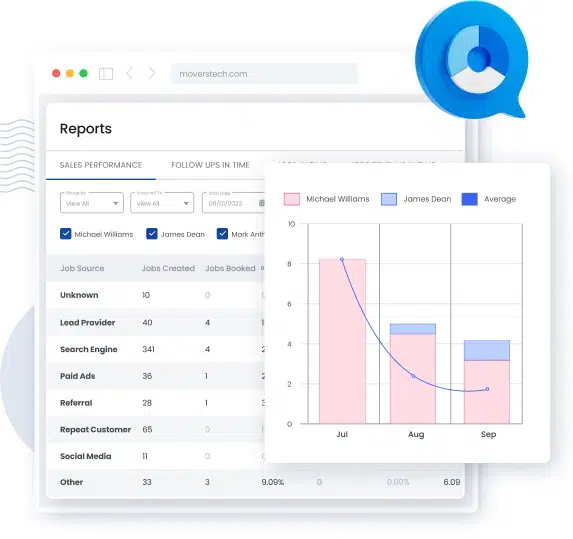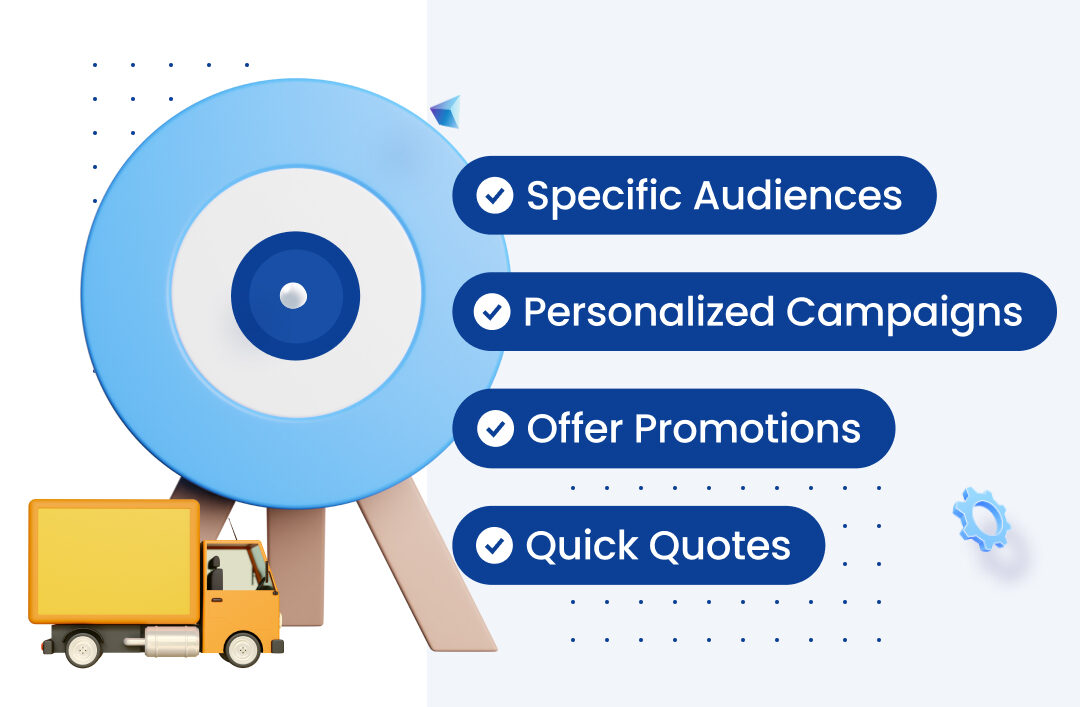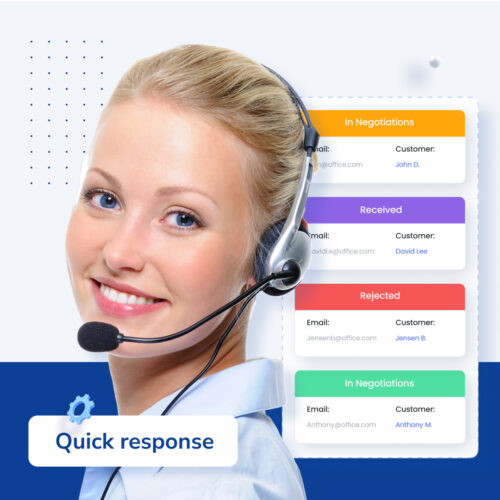Is your moving company stuck in the past? Many companies fail because they cling to outdated marketing methods and ignore the changes that could push them ahead. To survive and grow, you must adapt. You need effective marketing strategies, especially when the economy is unpredictable. MoversTech CRM will show you how to run your marketing, even if you’re not a marketer, with practical strategies and tools designed specifically for moving companies.
Embracing change in a competitive market
Many moving companies rely on traditional methods like referrals or local ads. While these methods may have worked in the past, they are no longer enough in today’s competitive market. You need to figure out how to run your marketing using the new digital tools. To stay ahead, you need to adapt by shifting away from these outdated strategies and get moving company reports to see which strategies work best.

Use digital marketing techniques
How to run your marketing is easier with digital tools. There are methods that allow you to target people actively searching for moving services, ensuring you attract clients who are ready to book. These tools are:
- SEO (Search Engine Optimization): SEO involves optimizing your website and content so that it appears higher in search engine results when potential clients search for moving services. By using relevant keywords, creating helpful content, and improving your site’s technical aspects (like speed and mobile-friendliness), you increase your visibility. When your website ranks higher, you get more organic traffic, which means more leads without paying for ads.
- Digital Ads: Digital ads include a variety of formats, such as banner ads, social media ads, and video ads. These ads can be displayed on platforms like Google, Facebook, or YouTube. They allow you to target specific demographics or people who have shown interest in moving services. This helps build brand awareness and keeps your business top-of-mind for people considering a move. With digital ads, you can set specific budgets, monitor performance, and adjust strategies in real time.
- PPC (Pay-Per-Click): PPC is a type of digital advertising where you pay a fee each time someone clicks on your ad. It’s an effective way to reach potential clients quickly, as your ad appears at the top of search results, making it one of the first things users see when they look for moving services online. The advantage of PPC is that you can target specific keywords (e.g., “moving companies near me”) and reach high-intent clients who are actively searching for your services.
What to do in economic downturns
Economic downturns and recessions present a chance to gain market share. When competitors cut their marketing budgets, it creates less competition for ad space and keywords, making PPC campaigns more affordable. Investing in PPC during these times allows you to reach high-intent clients actively searching for movers, often at a lower cost per click.
You can also use this time to refine your targeting, focus on specific local areas, or promote services that are still in demand (e.g., long-distance moves). This strategy not only keeps your brand visible but also attracts quality leads while others pull back.
The move acquisition system: A dual approach
The dual approach to how to run your marketing combines marketing and sales to create an efficient system. Marketing generates leads through channels like online ads, SEO, social media, and email campaigns. These tactics bring a steady stream of potential clients. To get the most out of these efforts, it’s important to capture leads from various sources using a CRM, ensuring they are properly managed and tracked.
Sales, on the other hand, focuses on managing and converting these leads. It uses a clear process, often with a CRM, to track and follow up. This makes leads move smoothly from the first contact to booking. When marketing and sales work together, you turn your efforts into real business growth.
To succeed, you need to master both areas. Booking moves and delivering services profitably requires more than occasional ads or relying on referrals. A system that keeps your pipeline full and your team efficient is necessary.
Create a steady lead flow
Relying on one source for leads, like referrals, isn’t enough. You need multiple channels—online ads, social media, email campaigns, and local SEO. These methods reach people actively searching for movers. The more diverse your channels, the more clients you attract. However, getting leads is only the first step; managing them well is just as important. By using a CRM, you can organize leads and take advantage of the benefits of automated follow-ups in moving, ensuring quick responses and better chances of booking clients.
To make the most of your leads, you need to connect your marketing and sales. Let’s say you get leads from phone calls, your website, and social media. Following up can be challenging. Without a clear system, you might lose potential clients. A CRM (Customer Relationship Management) system solves this problem. It captures leads automatically, assigns them to your team, and can even send follow-up messages. This saves time and helps your team respond quickly. Quick responses often mean more bookings.
Marketing fundamentals for moving companies
To grow your moving company, every marketing effort must be measured by its return on investment (ROI). If you spend money on channels that don’t work, you risk wasting resources. Tracking your results ensures you only invest in what actually brings you clients. For example, you might spend money on local ads but have no idea if they’re effective. If you aren’t tracking how many leads or bookings come from them, you could be spending money with no return.
Testing different marketing channels is important. Channels like SEO, PPC, direct mail, and buying leads can all be effective, but you need to find the one that works best for your business. Experimenting helps you see which methods attract the most clients. Maybe you launch a Facebook ad campaign targeting local moves and see a spike in calls. However, if you don’t know how many of those calls turn into booked jobs, you’re missing key information.
A CRM can help manage and track these efforts and show you how to run your marketing more effectively. Instead of using spreadsheets or manual tracking, a CRM organizes leads based on their source. It shows which marketing channels bring the most profit, so you know where to focus your budget. This saves time and ensures your money is spent where it counts.
How to run your marketing, even if you are not a marketer
You don’t need a marketing degree to succeed, but learning the basics is essential. Understanding key concepts helps you make smarter decisions about your marketing strategies and budget, ensuring your efforts are effective.
Many moving company owners feel overwhelmed by digital marketing platforms like Google Ads or Facebook Ads. It’s common to feel unsure when these platforms seem complex. However, taking small, practical steps can make them manageable:
- Invest time in learning the basics. Get familiar with concepts like SEO, PPC, and social media ads. This knowledge helps you understand how digital marketing works and what you can achieve.
- Work with vendors. You can collaborate with SEO companies or lead generators to boost your marketing efforts. However, understanding enough about these services allows you to evaluate their performance and ensure you get results.
Your CRM can help you here. Use its reporting tools to track and analyze your marketing efforts. The CRM shows which strategies work best so you can make data-driven decisions about where to allocate your marketing budget. This way, you invest confidently in what drives results.
Cutting costs, increasing profits
You need to reduce waste and maximize profits. By knowing which strategies work and which don’t, you can make precise adjustments to your marketing spend. This lets you focus on the best strategies for how to run your marketing and what delivers the best results.
To do this effectively, follow these steps:
- Regularly review your marketing data. Make it a habit to check your CRM or analytics tools weekly or monthly. Look for patterns—identify which channels bring in leads that actually convert into bookings. This could include tracking website traffic from SEO, ad performance from PPC campaigns, or social media inquiries.
- Identify underperforming channels. Use data to see which channels aren’t delivering results. For example, you might find that certain paid ad campaigns get clicks but few conversions. Or, maybe a lead generation service brings in many leads, but they’re not quality clients.
- Take action based on the data. When you identify channels that don’t work, reduce or eliminate spending on them. This frees up your budget to invest in higher-performing areas. For instance, if you find that Google Ads convert better than Facebook Ads for local moves, shift your budget to maximize your reach on Google.
Using tools like CRMs allows you to get moving company reports, which show you how to run your marketing. They will determine which channels perform best and where to optimize further. Let’s say you’ve been spending heavily on multiple ad campaigns. You notice that some generate clicks but don’t lead to bookings. By cutting these ineffective channels and reinvesting that money into more profitable ones (like SEO or direct mail that have shown better results), you optimize your marketing spend.
Integrating sales with marketing
To get the most out of your marketing efforts, you need a strong sales process. Even if your marketing attracts many leads, they won’t become clients without an efficient system to follow up and convert them.
Imagine you’re getting a lot of leads through ads and website inquiries. If your team doesn’t follow up quickly or consistently, those leads can go cold. Without a solid process, potential clients may lose interest or choose a competitor who responds faster.
Creating a customer acquisition system means combining effective marketing with a structured sales process. This ensures every lead is managed properly, from the first contact all the way to booking the move. It’s about creating a smooth experience for your clients so they feel confident in choosing your company.
A CRM will help you build this system. It helps track every interaction with a lead—whether through calls, emails, or social media—so nothing gets lost. A CRM also automates follow-ups, sending reminders or pre-set messages, which makes your process efficient and consistent. This way, your team spends less time managing leads manually and more time closing deals.
By integrating your sales and marketing efforts, you create a complete system that maximizes your marketing investment. It ensures that every lead is handled professionally and promptly, increasing the chances of converting them into paying clients.
Build a strong, resilient moving company
You have many competitors. The only way to succeed is to use smart marketing strategies and track your ROI effectively. You don’t have to be an expert marketer to know how to run your marketing. You just need the right approach, tool, and mindset. With a clear marketing plan, CRM tools to automate and track your efforts, and a willingness to learn and adapt, you can capture market share and grow your business. This approach allows you to refine your processes, respond quickly to leads, and maximize your investment in marketing.



